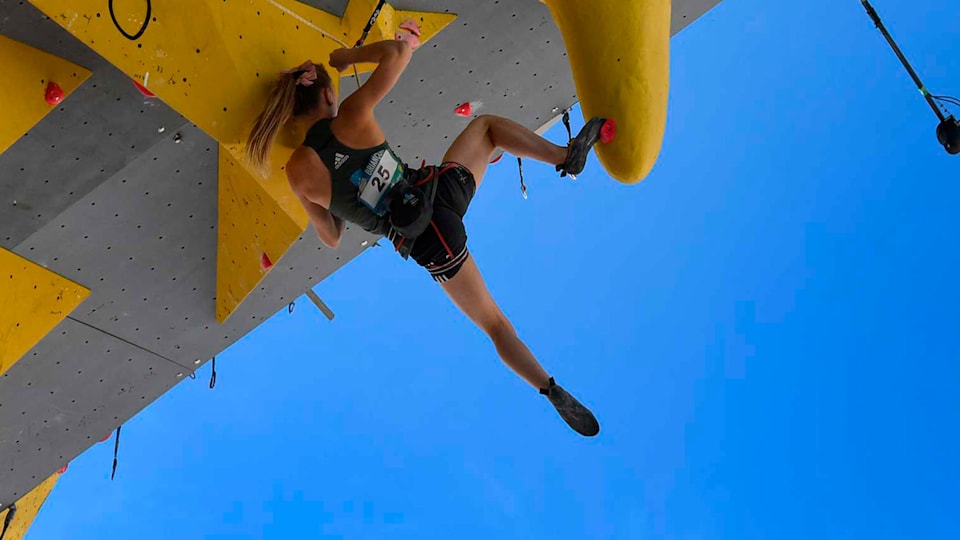
“Climbing is an instinct. It is one of the basic motor skills of human beings,” said Marco Maria Scolaris, President of the International Federation of Sport Climbing (IFSC). “It is an instinct we sometimes lose because we don’t need to climb a tree or a rope in order to survive, to escape wild animals, like it was thousands of years ago. But it is something everybody has inside.”
And in Tokyo the very best exponents of this innate art will compete for an Olympic medal, for the very first time. Three disciplines – lead, speed and bouldering – have been combined into one competition for sport climbing’s Olympic debut.
Athletes will scramble up a man-made, 15m wall in around six seconds in speed climbing, before showcasing immense strength, balance and technique as they defy gravity and free climb short, impossible looking routes in bouldering. Thirdly, the climbers will have their endurance and ability to identify the optimum lines tested by a 15-18m harnessed ascent, pock-marked by fearsome overhangs, in lead climbing.
“Climbing is a combination of body and mind. We are moving in a vertical dimension, something that other sports don’t do,” Scolaris said. “You need to be very fit. You need coordination. You need strength and you need the capacity to read the different holds you see on the rock.”
Planted firmly in the adrenaline-fuelled, high-octane, youth-orientated category, sport climbing has proudly taken its place alongside other Olympic newcomers, such as skateboarding, surfing and BMX.
An invitation to exhibit the best of the sport at the Youth Olympic Games Nanjing 2014 played a pivotal role in the sport’s recognition.
This reaction to the sport, coupled with the arrival, in 2014, of Olympic Agenda 2020 – IOC President Thomas Bach’s blueprint for the future of the Olympic Games – convinced Scolaris that the “door was open” for sport climbing to feature at the world’s biggest sporting event. It was not a conviction he had always held.
“I am one of those who started this [sport climbing] in 1985, organising the first international event,” said the Italian. “At that time none of us could even imagine that someday we would be in the Olympics.”
Climbing is a combination of body and mind. We are moving in a vertical dimension, something that other sports don’t do Marco Maria Scolaris President of the IFSC - Marco Maria Scolaris President of the IFSC
The foundation of the IFSC in 2007 coincided with clear evidence that the more climbing gyms were opened, the more climbers flocked to them. There are now IFSC-run World Cups in each of the three disciplines, for men and women, and overall titles for the best all-rounders.
The decision to combine speed, lead and bouldering in one event for the Tokyo 2020 Games was not straightforward, given the dedication and specialisation of many of the world’s best climbers. But it does come as part of a plan.
“From the beginning, we understood for this first appearance we could not have more than one medal [per gender],” Scolaris explained. “It would not have been good to leave any one discipline behind, especially at a national level. If we had proposed only one discipline, the two others would have been somewhat forgotten – we are talking Olympic preparations and funds.”
There were, naturally, some questions raised, but, as Scolaris pointed out, it is an “unmissable opportunity” and climbers “have three years to train for it”.
The 58-year-old is already relishing the chance to take sport climbing to as yet largely unchartered territories, highlighting the power of Olympic recognition and subsequent government funding as the key to hosting new events in places such as Africa. He is also delighted that the 2020 hosts have discovered an appetite for moving upwards.
“All of a sudden, the Japanese media have discovered our sport, discovered that there are more than half a million climbers in Japan, that they have walls everywhere and they have medal hopes for Tokyo 2020,” Scolaris said, before adding: “We now have live [TV] coverage in Japan of some of our events.”
